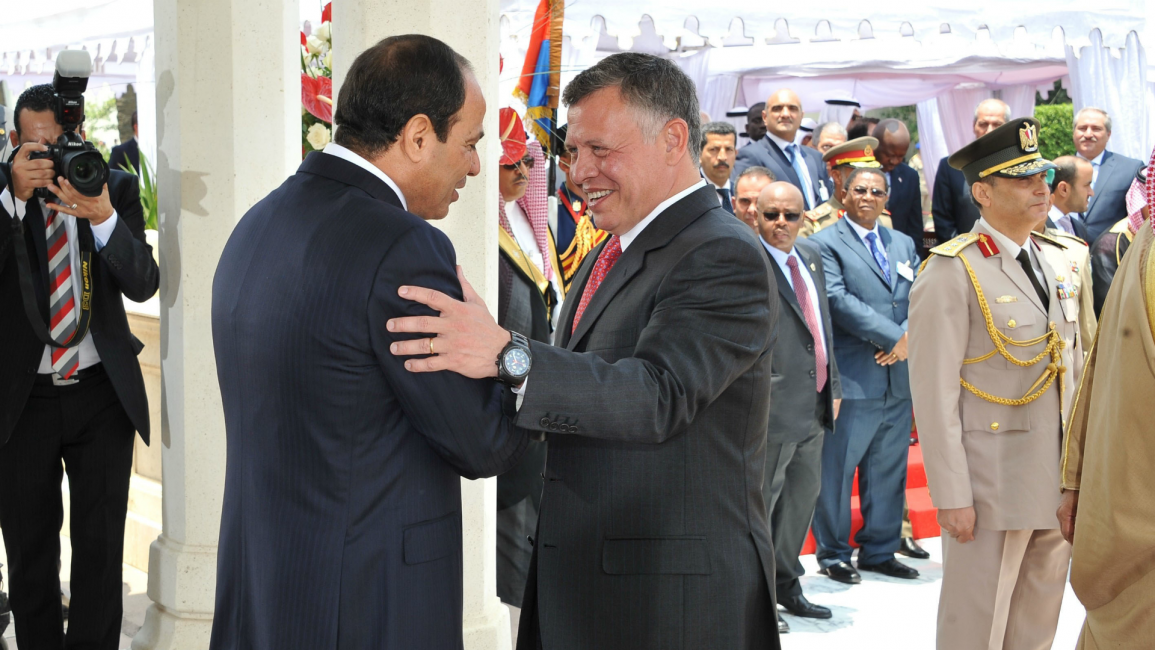
A king, a president and an angry populace
A king, a president and an angry populace
The support of Jordan's king for Egypt's Abdel Fattah al-Sisi shows a sharp division between state and society in the kingdom.
3 min read
Abdullah congratulates Sisi on his June 2014 inauguration [Anadolu]
Abdel Fattah al-Sisi received a warm welcome in Amman on 11 December, as Jordanian decision-makers showed their support for the Egyptian president and his policies.
Ten days earlier, King Abdullah of Jordan visited Sisi in Cairo, before travelling to the US to meet President Barack Obama and various think-tanks. One of his aims was to promote Sisi in US circles and defend the former general's policies.
Abdullah may have realised there was extensive disagreement about Sisi in Washington, with many politicians unable to accept him, or his coup against a democratically elected government. The New York Times ran a scathing editorial attacking Sisi while Abdullah was there, accusing his regime of being worse than Hosni Mubarak's.
Is Amman prepared to go this far to accept Sisi and his regime? The answer is yes. In fact, along with other Arab partners, Jordan supported Sisi's rise to power. The kingdom helped him topple Mohamed Morsi from the presidency, hoping it would end the chain of revolutions in the region.
Regionally, Jordan is part of the conservative Arab axis that aims to protect "the status quo", resist democratic change, and stand against "political Islam", especially the Brotherhood. This camp is opposite to the Turkish-Qatari axis, which supports integrating Islamists into the region.
Previously, the conservative priority was to confront an Iranian-Syrian-Brotherhood alliance. However, after the recent split between the Brotherhood and Iran, Arab conservatives have reorganised their priorities. Now they see political Islam itself as their main threat.
Domestically, the Brotherhood is the main reason Jordan supports Sisi. The organisation intensified its rhetoric at the peak of the Arab Spring, believing it could win control of Egypt, Tunisia, and even Syria. In Jordan, its relations with the regime deteriorated. Jordan supported Sisi to undermine the Islamists in Jordan, which were the most influential and widespread opposition force.
Jordan wanted to weaken the Brotherhood and destroy its popular and political power base.
However, the Brotherhood has deep social and historical roots in Jordan, and is the main representative of Jordanians of Palestinian origin. This makes it unrealistic to talk about banning the organisation. In addition, there is a large sector of Jordanian society that opposes Sisi.
As a result there are divisions between state policy and public opinion, which is damaging for relations between state and society.
Historically, Jordan has always adopted a moderate foreign policy and dealt with Arab partners as equals, which has helped bridge gaps between state and society. This appears no longer to be the case.
This article is an edited translation from our Arabic edition.
Opinions expressed in this article remain those of the author, and do not necessarily reflect the opinions of al-Araby al-Jadeed, its editorial board or staff.
Ten days earlier, King Abdullah of Jordan visited Sisi in Cairo, before travelling to the US to meet President Barack Obama and various think-tanks. One of his aims was to promote Sisi in US circles and defend the former general's policies.
Abdullah may have realised there was extensive disagreement about Sisi in Washington, with many politicians unable to accept him, or his coup against a democratically elected government. The New York Times ran a scathing editorial attacking Sisi while Abdullah was there, accusing his regime of being worse than Hosni Mubarak's.
| Jordan supported Sisi's rise to power. The kingdom helped him topple Mohamed Morsi from the presidency. |
Regionally, Jordan is part of the conservative Arab axis that aims to protect "the status quo", resist democratic change, and stand against "political Islam", especially the Brotherhood. This camp is opposite to the Turkish-Qatari axis, which supports integrating Islamists into the region.
Previously, the conservative priority was to confront an Iranian-Syrian-Brotherhood alliance. However, after the recent split between the Brotherhood and Iran, Arab conservatives have reorganised their priorities. Now they see political Islam itself as their main threat.
Domestically, the Brotherhood is the main reason Jordan supports Sisi. The organisation intensified its rhetoric at the peak of the Arab Spring, believing it could win control of Egypt, Tunisia, and even Syria. In Jordan, its relations with the regime deteriorated. Jordan supported Sisi to undermine the Islamists in Jordan, which were the most influential and widespread opposition force.
Jordan wanted to weaken the Brotherhood and destroy its popular and political power base.
However, the Brotherhood has deep social and historical roots in Jordan, and is the main representative of Jordanians of Palestinian origin. This makes it unrealistic to talk about banning the organisation. In addition, there is a large sector of Jordanian society that opposes Sisi.
As a result there are divisions between state policy and public opinion, which is damaging for relations between state and society.
Historically, Jordan has always adopted a moderate foreign policy and dealt with Arab partners as equals, which has helped bridge gaps between state and society. This appears no longer to be the case.
This article is an edited translation from our Arabic edition.
Opinions expressed in this article remain those of the author, and do not necessarily reflect the opinions of al-Araby al-Jadeed, its editorial board or staff.



